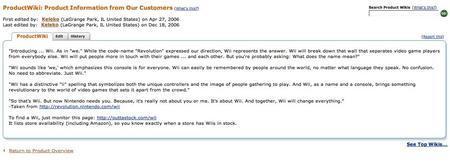It’s been widely reported that Amazon has invested in Wikia, a site for community vertical wikis. Though I didn’t expect this, I am also not shocked at the investment. At their heart wikis allow anyone to create and contribute to a page on a site. Using that loose definition, this is not the first exprimentation with wiki-like feature on Amazon properties. It has come in (at least) two other places.
![]() Robot Co-Op Sites – The Robot Coop is a small company made up of ex-Amazons that has taken an investment from Amazon. They have made several social networking sites; you have probably heard of 43 Things, 43 Places, 43 People and AllConsuming.net.
Robot Co-Op Sites – The Robot Coop is a small company made up of ex-Amazons that has taken an investment from Amazon. They have made several social networking sites; you have probably heard of 43 Things, 43 Places, 43 People and AllConsuming.net.
On these sites, users are able to create new pages very similarly to a wiki. Once a new page has been created others users can add content to the page in the form of photos, tags, and stories about that thing, place or people. The pages that are created aren’t wiki-pages in the strictest sense. They are structured pages and are not blank templates waiting to be filled in by any anonymous comer, but those wiki-like qualities give them a lot of utility and have led their sites to do well. The wiki-like nature of their site has led them to add new features, such as events, based on how people were using the site.
A further examination shows:
- Any user can create a page – Any logged in user is able to create a new page on one of their sites. It’s always in answer to a question: Where Do You Want to Go? (a place), What Do you want to do? (A goal), What Do you want to consume? (a movie, book, game, food, etc), Who Do You Want to Meet? ( a person). Once these pages are created photos can be attached, stories can be added, tags can be applied.
- Any user of the system can add to the page – All of their sites allow other users to add content such as photos, tags, and written material. This is where the pages really get flushed out; no one person on the site can tell you all there is to know about a place, goal, or person. Just like on a wiki it becomes a collaborative exercise.
- The user must be logged in – As with many social-networking sites they require you to be logged in to cut back on spam and associate it back to that account. Though not wiki in the strictest sense this is certainly a common requirement.

Amazon Site – On Amazon’s product page (like for the Wii — see the screenshot above) there is a wiki. You’ll see the content from the top-level page of that product’s wiki. If you click through you can add more pages, link to other sites, and modify the text. It’s a full wiki with history and alerts. Based on the top wiki pages, use hasn’t been made it very far out of the gamer genre. As the Amazon wikis gain in popularity I am sure that we will see it used not only for product info, but also for commentary like Amazon tags have been used (Boingboing reported that DRM products are being tagged with DefectiveByDesign).
Why is this important? Amazon is one of the most interesting companies on the net. They have a huge audience and are innovators. Other than Wikipedia, wikis have not taken off. I wonder if Amazon thinks it has found the right way bridge this gap to actually bring wikis to the average user and is making this investment in Wikia to get there own wiki platform to further these investments — for its own sites, the Robot Coop runs seperately. Will they take this further and begin to allow users to actually create product pages on the Amazon site? Perhaps this will be a way that they can learn about new products that they should carry.
